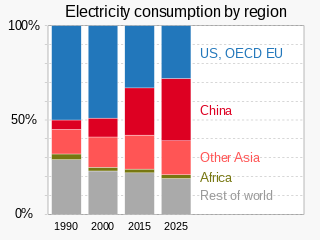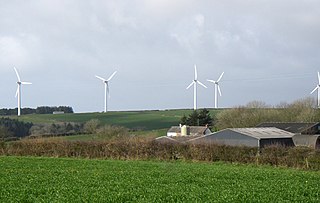
Renewable energy is energy from renewable natural resources that are replenished on a human timescale. The most widely used renewable energy types are solar energy, wind power, and hydropower. Bioenergy and geothermal power are also significant in some countries. Some also consider nuclear power a renewable power source, although this is controversial. Renewable energy installations can be large or small and are suited for both urban and rural areas. Renewable energy is often deployed together with further electrification. This has several benefits: electricity can move heat and vehicles efficiently and is clean at the point of consumption. Variable renewable energy sources are those that have a fluctuating nature, such as wind power and solar power. In contrast, controllable renewable energy sources include dammed hydroelectricity, bioenergy, or geothermal power.

Microgeneration is the small-scale production of heat or electric power from a "low carbon source," as an alternative or supplement to traditional centralized grid-connected power.

A Zero-Energy Building (ZEB), also known as a Net Zero-Energy (NZE) building, is a building with net zero energy consumption, meaning the total amount of energy used by the building on an annual basis is equal to the amount of renewable energy created on the site or in other definitions by renewable energy sources offsite, using technology such as heat pumps, high efficiency windows and insulation, and solar panels.
Renewable heat is an application of renewable energy referring to the generation of heat from renewable sources; for example, feeding radiators with water warmed by focused solar radiation rather than by a fossil fuel boiler. Renewable heat technologies include renewable biofuels, solar heating, geothermal heating, heat pumps and heat exchangers. Insulation is almost always an important factor in how renewable heating is implemented.

Total energy consumption in the United Kingdom was 142.0 million tonnes of oil equivalent in 2019. In 2014, the UK had an energy consumption per capita of 2.78 tonnes of oil equivalent compared to a world average of 1.92 tonnes of oil equivalent. Demand for electricity in 2023 was 29.6 GW on average, supplied through 235 TWh of UK-based generation and 24 TWh of energy imports.

Electric energy consumption is energy consumption in the form of electrical energy. About a fifth of global energy is consumed as electricity: for residential, industrial, commercial, transportation and other purposes. The global electricity consumption in 2022 was 24,398 terawatt-hour (TWh), almost exactly three times the amount of consumption in 1981. China, the United States, and India accounted for more than half of the global share of electricity consumption. Japan and Russia followed with nearly twice the consumption of the remaining industrialized countries.
The Low Carbon Building Programme (LCBP) was a payments system in England, Scotland and Wales. The UK Government programme was administered by BERR and ran from 1 April 2006 until its closure to new applications on 24 May 2010. The scheme was replaced by the Renewable Heat Incentive in November 2011.

Drax Group plc, trading as Drax, is a power generation business. The principal downstream enterprises are based in the UK and include Drax Power Limited, which runs the biomass fuelled Drax power station, near Selby in North Yorkshire. The Group also runs an international biomass supply chain business. The company is listed on the London Stock Exchange and is a constituent of the FTSE 250 Index.

A low-carbon economy (LCE) is an economy which absorbs as much greenhouse gas as it emits. Greenhouse gas (GHG) emissions due to human activity are the dominant cause of observed climate change since the mid-20th century. There are many proven approaches for moving to a low-carbon economy, such as encouraging renewable energy transition, energy conservation, and electrification of transportation. An example are zero-carbon cities.

The production of renewable energy in Scotland is a topic that came to the fore in technical, economic, and political terms during the opening years of the 21st century. The natural resource base for renewable energy is high by European, and even global standards, with the most important potential sources being wind, wave, and tide. Renewables generate almost all of Scotland's electricity, mostly from the country's wind power.

The developing nations of Africa are popular locations for the application of renewable energy technology. Currently, many nations already have small-scale solar, wind, and geothermal devices in operation providing energy to urban and rural populations. These types of energy production are especially useful in remote locations because of the excessive cost of transporting electricity from large-scale power plants. The applications of renewable energy technology has the potential to alleviate many of the problems that face Africans every day, especially if done in a sustainable manner that prioritizes human rights.

Renewable energy in the United Kingdom contributes to production for electricity, heat, and transport.

Renewable energy in Finland increased from 34% of the total final energy consumption (TFEC) in 2011 to 48% by the end of 2021, primarily driven by bioenergy (38%), hydroelectric power (6.1%), and wind energy (3.3%). In 2021, renewables covered 53% of heating and cooling, 39% of electricity generation, and 20% of the transport sector. By 2020, this growth positioned Finland as having the third highest share of renewables in TFEC among International Energy Agency (IEA) member countries.

Sustainable development in Scotland has a number of distinct strands. The idea of sustainable development was used by the Brundtland Commission which defined it as development that "meets the needs of the present without compromising the ability of future generations to meet their own needs." At the 2005 World Summit it was noted that this requires the reconciliation of environmental, social and economic demands - the "three pillars" of sustainability. These general aims are being addressed in a diversity of ways by the public, private, voluntary and community sectors in Scotland.
Mandatory renewable energy targets are part of government legislated schemes which require electricity merchandisers to source-specific amounts of aggregate electricity sales from renewable energy sources according to a fixed time frame. The objective of these schemes is to promote renewable energy and decrease dependency on fossil fuels. If this results in an additional expenditure of electricity, the additional cost is distributed across most customers by increases in other tariffs. The cost of this measure is therefore not funded by the government budgets, except for costs of establishing and monitoring the scheme and any audit and enforcement actions. As the cost of renewable energy has become cheaper than other sources, meeting and exceeding a renewable energy target will also reduce the expenditure of electricity to consumers.
Eco-investing or green investing is a form of socially responsible investing where investments are made in companies that support or provide environmentally friendly products and practices. These companies encourage new technologies that support the transition from carbon dependence to more sustainable alternatives. Green finance is "any structured financial activity that’s been created to ensure a better environmental outcome."

The International Institute of Refrigeration (IIR), is an independent intergovernmental science and technology-based organization that promotes knowledge of refrigeration and associated technologies and applications on a global scale that improve quality of life in a cost-effective and environmentally sustainable manner, including:

An energy transition is a major structural change to energy supply and consumption in an energy system. Currently, a transition to sustainable energy is underway to limit climate change. Most of the sustainable energy is renewable energy. Therefore, another term for energy transition is renewable energy transition. The current transition aims to reduce greenhouse gas emissions from energy quickly and sustainably, mostly by phasing-down fossil fuels and changing as many processes as possible to operate on low carbon electricity. A previous energy transition perhaps took place during the Industrial Revolution from 1760 onwards, from wood and other biomass to coal, followed by oil and later natural gas.
Denmark is a leading country in renewable energy production and usage. Renewable energy sources collectively produced 81% of Denmark's electricity generation in 2022, and are expected to provide 100% of national electric power production from 2030. Including energy use in the heating/cooling and transport sectors, Denmark is expected to reach 100% renewable energy in 2050, up from the 34% recorded in 2021.
Octopus Energy Group is a British renewable energy group. It was founded in 2015 with the backing of Octopus Group, a British asset management company. Headquartered in London, the company has operations in the United Kingdom, France, Germany, Italy, Spain, Australia, Japan, New Zealand and the United States. Octopus is the UK's largest supplier of electricity to domestic customers, and the second largest in domestic gas.












